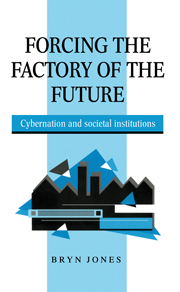Book contents
- Frontmatter
- Contents
- List of figures
- List of tables
- Acknowledgements
- List of acronyms and abbreviations
- Part I The workshop versus the factory
- Part II Technologies of control
- Part III Cybernation and flexibility
- Overview
- 6 The cybernated factory and the American dream
- 7 An American deviant: FMS at Alpha
- 8 Easy-peasy Japanesy: flexible automation in Japan
- 9 Revolution from above: FMS in Britain
- 10 The third Italy and technological dualism
- 11 Conclusion: the struggle continues
- Appendix: sources and methods
- Notes
- Bibliography
- Index
6 - The cybernated factory and the American dream
from Part III - Cybernation and flexibility
Published online by Cambridge University Press: 06 July 2010
- Frontmatter
- Contents
- List of figures
- List of tables
- Acknowledgements
- List of acronyms and abbreviations
- Part I The workshop versus the factory
- Part II Technologies of control
- Part III Cybernation and flexibility
- Overview
- 6 The cybernated factory and the American dream
- 7 An American deviant: FMS at Alpha
- 8 Easy-peasy Japanesy: flexible automation in Japan
- 9 Revolution from above: FMS in Britain
- 10 The third Italy and technological dualism
- 11 Conclusion: the struggle continues
- Appendix: sources and methods
- Notes
- Bibliography
- Index
Summary
Introduction
During the 1980s I criss-crossed North America by plane and car visiting Flexible Manufacturing Systems (FMSs) in aerospace, agricultural, construction and other machinery-making firms. I observed at first hand nine of these systems which bring the operations of automatic machine-tools, the automatic transport of workpieces and tool-cutters, and their scheduling, under central computer control. FMSs can justifiably be regarded as colonies of cybernation, or – to use the technologists' jargon – of Computer Integrated Manufacturing (CIM) within larger conventional plants. It is justifiable because FMSs consist of these three separate automatic systems: machining operations; tool and workpiece conveyance; and overall scheduling. FMS therefore represents the climax of the piecemeal automation that began with NC and a projected ‘final solution’ to the idiosyncratic complexities of batch production. CIM and FMS aspired to achieve factory-like flow methods of control and production within the constraints of small-batch product variety; a Fordism for the ‘metal-bashers’.
In these plants I conducted semi-structured interviews with managers, engineers, workers and trade unionists (see Jones 1985b, 1989; Jones and Scott 1987). The resulting data partially corroborate the arguments of other writers (Noble 1984; Jaikumar 1986) that the claimed, or potential, flexibility and efficiency of these forms of CIM are not realised by the US firms using them. The technology was combined with an over-specialised pattern of work organisation, made up of restrictive occupational responsibilities, that seem ill-suited to the needs of controlling, adjusting and maintaining complex interacting systems.
- Type
- Chapter
- Information
- Forcing the Factory of the FutureCybernation and Societal Institutions, pp. 131 - 150Publisher: Cambridge University PressPrint publication year: 1997



